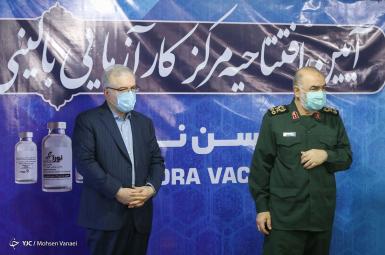
Khamenei’s Doctor Writes To UN Defending The Ban On Western Vaccines
In a letter to Antonio Guterres, Secretary-General of the United Nations, the Chairman of the Iranian Academy of Medical Sciences has called for the UN to support Iran over its decisions about vaccines. Dr Alireza Marandi called on the UN to facilitate Iran’s access to medical equipment, technology and medicines including Covid-19 vaccines, and asked the UN “not to further politicize our decisions.”
Iran Supreme Leader Ali Khamenei banned the purchase of US and British-made COVID-19 vaccines on January 8, saying that "Importing vaccines made in the US or the UK is prohibited."
Khamenei added: "They are completely untrustworthy. It is not unlikely that they would want to contaminate other nations. Given our experience with France's HIV-tainted blood supplies, French vaccines are not trustworthy either."
Following the remarks, many international media outlets and Iranian social media users charged that Khamenei has ignored the potentially disastrous consequences of such a ban on the lives of Iranians. Khamenei's ban also undermines Iran's complaints that US sanctions have prevented the purchase of Covid vaccines.
Marandi wrote in his letter, published Moday [Jan. 11], that it was Iran’s essential right to reject vaccines it believed are unsafe or inadequately tested. He expressed concern that the World Health Organization (WHO) was “biased in favor of inadequately-tested American technology, which could risk many lives around the world, in order to woo the US back into the organization.”
US President Donald Trump took the United States out of the WHO last May, but President-elect Joe Biden, who takes office on January 20, has pledged to return to the organization as part of his wider commitment to multilateral.
Marandi, who is also the family doctor of Iran’s Supreme leader Ali Khamenei, accused the UN and international human rights organizations of “silence in the face of these oppressive medical sanctions,” a reference to Trump’s ‘maximum pressure’ introduced after he left the nuclear agreement in 2018.
Marandi referred to a call from Mike Ryan, Executive Director of the WHO’s Health Emergency Program, on Iran not to politicize the pandemic, made at a press conference a day after Khamenei banned importing of vaccines made in the US and United Kingdom. Iran’s leader called the Americans and British “completely untrustworthy” and referred to Iran’s experience of importing blood products contaminated with the HIV virus from France in the 1980s.
Marandi ended his letter: “We are sovereign, and our decision to reject vaccines with dubious or inadequately tested technology, safety, or trustworthiness issues is our inalienable right. We would appreciate it if you would not further politicize our decisions, and support us by helping us access all the medical equipment, technologies, medications, and reliable vaccines necessary to handle this pandemic.”
The WHO reported on Monday the start of delivery of $50 million in medical equipment in collaboration with the Iranian Health Ministry to 136 public hospitals and 43 laboratories as a collaboration to support the health care system in diagnosing and treating Covid patients.
Iran also announced on Monday that Foreign Minister Mohammad Javad Zarif was visiting Cuba to facilitate importing Cuban vaccines. Iran’s health ministry on Monday reported 6,208 new Covid cases on Monday, with 91 deaths, showing declining numbers as strict lockdown measures restrict the spread of the virus.








